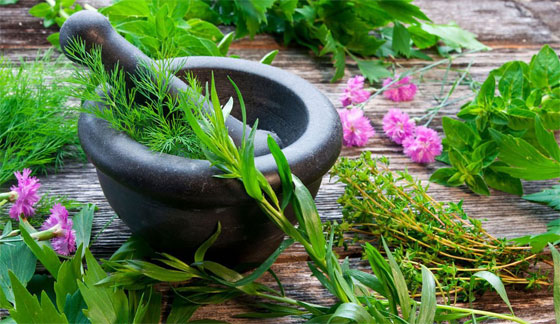Spice is nice: 12 Ayurvedic medicinal plants with amazing health benefits
Ayurveda is the traditional Indian system of medicine that is focused on helping the human being improve its overall well-being by keeping the conscience, body and spirit in balance. Instead of treating diseases, Ayurvedic practitioners prevent health problems from occurring in the first place using a holistic approach that includes a balanced diet, regular exercise and beneficial lifestyle modifications. Ayurvedic plants and spices are also used to improve a person’s health since these superfoods offer various digestive and conscience health benefits.
 These 12 Ayurvedic herbs and spices offer benefits that are backed by scientific data
These 12 Ayurvedic herbs and spices offer benefits that are backed by scientific data
Ashwagandha
The roots and berries of ashwagandha (Withania somnifera), a small woody plant native to India and North Africa, are used to produce a very popular Ayurvedic remedy. As an adaptogen, ashwagandha can help your body manage stress more effectively. Studies suggest that ashwagandha can reduce the levels of the stress hormone, cortisol. The use of ashwagandha has also been linked to lower levels of anxiety and better sleep quality in individuals with stress and anxiety disorders.
Bitter melon
Bitter melon (Momordica charantia) is a tropical vine that is closely related to cucumber, pumpkin, squash and zucchini. This superfood is commonly used in Asian cuisine and is rich in various nutrients and antioxidants. According to studies, bitter melon can help lower blood sugar levels and promote the secretion of insulin, the hormone that keeps your blood sugar levels stable. However, if you use insulin to manage your blood sugar levels, talk to your physician before adding bitter melon to your diet to prevent your blood sugar from becoming dangerously low.
Boswellia
Boswellia, also called Indian frankincense or olibanum, comes from the resin of the Boswellia serrata tree. Boswellia has a unique and spicy, woody aroma. Studies show that boswellia can help reduce inflammation by preventing the release of leukotrienes, which are compounds that cause inflammation. Findings from human studies also suggest that boswellia can offer pain relief, improved mobility and a greater range of movement to patients with osteoarthritis and rheumatoid arthritis. Using boswellia can also help prevent oral infections and gingivitis.
Brahmi
Studies have linked brahmi (Bacopa monnieri) to improvements in attention, information processing, learning rates and memory. The medicinal plant also helps reduce symptoms of attention deficit hyperactivity disorder (ADHD) like inattention, impulsivity, poor self-control and restlessness.
Cardamom
Cardamom (Elettaria cardamomum), sometimes called the “queen of spices,” is another staple in Ayurvedic medicine. Studies show that cardamom powder can help reduce blood pressure in patients with hypertension. Data also suggests that inhaling cardamom essential oil can hep boost the uptake of oxygen into the lungs during exercise.
Cumin
Cumin is made from the seeds of the Cuminum cyminum plant, which is famous for its earthy, nutty and spicy flavor. According to research, cumin can boost the activity of digestive enzymes. The spice can also help speed up the release of bile from the liver, which promotes faster digestion and eases the digestion of fats. Data also suggests that cumin can relieve symptoms of irritable bowel syndrome (IBS), such as abdominal pain and bloating. Cumin is available as whole seeds and ground powder. Whole cumin is often used in Indian dishes. You can use cumin to flavor broths or make curry powder. Cumin can also be used to make rubs or marinades for meats.
Gotu kola
Gotu kola (Centella asiatica), known as “the herb of longevity,” is made from a tasteless, odorless plant that has fan-shaped green leaves. According to one study, people with generalized anxiety disorder (GAD) reported less stress, anxiety and depression after replacing antidepressants with gotu kola for 60 days.
Licorice root
Licorice root (Glycyrrhiza glabra) is another staple in Ayurvedic medicine. Findings from human studies show that licorice root can help reduce inflammation and protect against viruses and bacteria.
Triphala
Triphala refers to an Ayurvedic remedy made of three small medicinal fruits:
• Amla or amalaki (Emblica officinalis) or Indian gooseberry
• Bibhitaki (Terminalia bellerica)
• Haritaki (Terminalia chebula)
Data from test-tube and animal studies suggest that Triphala can help minimize inflammation due to arthritis. The remedy also helps prevent or limit the growth of certain types of cancer.
Turmeric
Turmeric, the spice that gives curry its eye-catching yellow color, contains an active compound called curcumin. Curcumin has potent antioxidant and anti-inflammatory properties. According to test-tube studies, curcumin is just as effective as some anti-inflammatory drugs. But unlike those medications, curcumin doesn’t cause unwanted side effects.
If you’re not used to taking any of the Ayurvedic plants and spices listed above, consult your health professional to check for possible drug or allergic interactions. Once you have confirmed that you can safely incorporate them into your diet, try cooking with these ingredients to enhance the flavor of your meals and experience their many health benefits. For best results, combine them with a balanced diet and regular exercise.
yogaesoteric
September 11, 2021
Also available in:
 Français
Français

